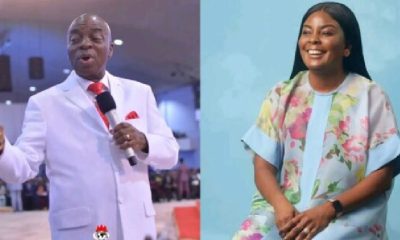News
VP Shettima Drops Bombshell: Buhari Not to Blame for Nigeria’s Woes!

Vice President Senator Kashim Shettima has asserted that the challenges encountered by the present administration upon assuming office on May 29 cannot be solely attributed to the immediate-past administration led by former President Muhammadu Buhari.
Speaking at a roundtable hosted by the 21st Century Chronicle, Shettima emphasized that President Bola Tinubu made a tough decision for the country’s benefit rather than opting for an easier path.
He stated, “The president chose the option that would save the lives of the people instead of prolonging economic turmoil. We refrain from laying blame on previous administrations as leadership requires courage and continuity.”
Before the current administration assumed office, one of the major challenges faced was the issue of fuel subsidy removal, which had persisted for 20 to 30 years, according to Shettima. He explained that there was insufficient budgetary provision for it in the fiscal year, leading to the need for its removal.
A year before we took office, Nigeria’s debt service to revenue ratio had grown to 111.18 percent, posing a significant economic threat,” Shettima continued. Our debt service ratio meant that for every N100,000 earned, an additional N11,800 had to be borrowed to service debts. This was unsustainable.”
Consequently, the administration had to make the difficult decision to jettison the subsidy regime, despite it being a bitter pill to swallow.
Shettima also highlighted a past incident where a presidential candidate in the previous election pointed to Argentina as a model for Nigeria’s economic trajectory. However, within weeks, Argentina experienced a surge in inflation, underscoring the complexities of governance.
Shettima emphasized that governance requires strategic decision-making tailored to Nigeria’s unique circumstances, rather than blindly copying models from other countries.
Vice President Senator Kashim Shettima has asserted that the challenges encountered by the present administration upon assuming office on May 29 cannot be solely attributed to the immediate-past administration led by former President Muhammadu Buhari.
Speaking at a roundtable hosted by the 21st Century Chronicle, Shettima emphasized that President Bola Tinubu made a tough decision for the country’s benefit rather than opting for an easier path.
He stated, “The president chose the option that would save the lives of the people instead of prolonging economic turmoil. We refrain from laying blame on previous administrations as leadership requires courage and continuity.”
Before the current administration assumed office, one of the major challenges faced was the issue of fuel subsidy removal, which had persisted for 20 to 30 years, according to Shettima. He explained that there was insufficient budgetary provision for it in the fiscal year, leading to the need for its removal.
A year before we took office, Nigeria’s debt service to revenue ratio had grown to 111.18 percent, posing a significant economic threat,” Shettima continued. Our debt service ratio meant that for every N100,000 earned, an additional N11,800 had to be borrowed to service debts. This was unsustainable.”
Consequently, the administration had to make the difficult decision to jettison the subsidy regime, despite it being a bitter pill to swallow.
Shettima also highlighted a past incident where a presidential candidate in the previous election pointed to Argentina as a model for Nigeria’s economic trajectory. However, within weeks, Argentina experienced a surge in inflation, underscoring the complexities of governance.
Shettima emphasized that governance requires strategic decision-making tailored to Nigeria’s unique circumstances, rather than blindly copying models from other countries.
News
Reps Tackle CBN, OAGF Over Missing Grants, Bailout Funds

According to him, such financial mishandling not only disrupts critical public services and projects but also results in major losses to the nation’s purse—resources that could have been channelled into crucial services and developmental efforts, as laid out in Section 14(2)(b) of the Constitution.
Speaker Abbas, thereafter setup a Special Committee to be chaired by Rep. Chinedu Martins to immediately launch a probe into the “Utilisation of take-off grants, bailout funds, and interventions allocated to MDAs, government institutions, and GOEs from 2015 to present.”
News
Abuja light rail project must be commissioned on May 29-Wike vows

The FCT Minister, Mr. Nyesom Wike, expressed satisfaction with the progress on the Abuja light rail project, reaffirming its May 29 delivery as sacrosanct.
He made these assurances after inspecting the ongoing construction of access roads to the train stations on Wednesday, from Metro Train Station in the Central Area to Nnamdi Azikiwe International Airport, Abuja.
Reassuring journalists accompanying him, the minister reiterated that President Bola Tinubu would commission the rail project on May 29 to mark his second year in office.
The visited stations were Wupa station near Idu and Bassanjiwa station near the airport.
“This is part of our routine inspection of ongoing projects to see the contractors’ progress,” Wike explained.
“We are working day and night to fulfill our promise to President Tinubu and FCT residents. By May, Mr. President will ride on the Metro line.”
News
Just in: Alleged Herdsmen Armed With AK-47 Rifles Take Over Communities In Benue State

Gunmen suspected to be Fulani herdsmen are currently invading some communities in the Ukum Local Government Area of Benue State.
According to sources, the herdsmen armed with AK-47 rifles stormed the community around 04:15pm on Thursday.
“Our lives are in danger this evening, armed Fulani herdsmen, about 600 in numbers have taken over our communities this evening,” a resident told SaharaReporters.
“They’re currently moving around towns in Ukum Local Government Area of Benue state. No security personnel at all, Governor Alia didn’t send security, they said operation will start soon once they (herders) have observed the place.”
The insecurity situation in Benue has been alarming in recent weeks with attacks from gunmen suspected to be herdsmen.
The media had reported that suspected herdsmen again unleashed terror in Benue State, attacking three communities in Otukpo Local Government Area (LGA) on Wednesday, just a day after 11 people were killed in a deadly raid on Otobi community.
The latest victims of the escalating violence were Emichi, Odudaje, and Okpamaju, communities that had previously suffered an attack in February, which left five people dead.
However, the renewed attack has created fear and mass displacement among residents, with women and children fleeing to safety.
Local sources say the death toll from the fresh attack remains unclear, but several casualties are feared.
-

 News10 hours ago
News10 hours agoBREAKING: Unknown gunmen reportedly storm Senator Natasha’s family residence
-

 News13 hours ago
News13 hours agoSnub story on removal of Rivers Sole Administrator, it’s FAKE-Chief Registrar
-

 News19 hours ago
News19 hours ago“How my father escaped assassination” – Bishop Oyedepo’s daughter
-

 News19 hours ago
News19 hours agoFG expresses sympathy for CBEX victims, urges a united effort to combat Ponzi schemes
-

 News12 hours ago
News12 hours agoSAD! Again, Alleged Herdsmen Attack Three Benue Communities
-

 Politics12 hours ago
Politics12 hours agoPDP govs are jokers, can’t stop coalition train, Atiku boasts
-

 News4 hours ago
News4 hours agoAbuja light rail project must be commissioned on May 29-Wike vows
-

 News10 hours ago
News10 hours agoLawmaker Slams NBA Over Rivers Crisis, Demands Return of N300m





